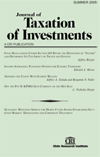Registered Domestic Partners and the Tax Ownership of Property: Poe v. Seaborn Still Matters, But it Shouldn’t
Author: Leon Gabinet .
Source: Volume 30, Number 02, Winter 2013 , pp.59-90(32)

< previous article |next article > |return to table of contents
Abstract:
When the Supreme Court decided Poe v. Seaborn in 1930, it did not foresee the mischief its decision would cause in later years. Seaborn held that, under the community property law of the state of Washington, each spouse had a vested interest in one half of all community property, including income, notwithstanding the husband’s right to control and manage the property. Accordingly,spouses in community property states were entitled to split their income for income tax purposes. This gave married persons in community states a decided advantage over their counterparts in common law states, who could not enjoy this advantage. Because of this geographical disparity, Congress, in 1948, enacted the joint filing provisions giving all married persons the right to file joint returns and thus split their incomes. However, this legislation itself created a series of problems, to wit: the marriage penalty, innocent spouse issues, problems in division of marital assets in divorce, and estate issues. Recently, when the California legislature extended its community property law to cover Registered Domestic Partners (RDPs), Seaborn was pressed into service to allow income splitting for California RDPs, who are not spouses under federal law. This again has produced a series of geographic disparities in tax treatment of same sex unions in common law and community property states. Moreover, the extension of the community property regime to non-married persons is itself a departure from the age-old understanding that community property is a marital property regime solely applicable to married persons.Keywords: Poe v. Seaborn, Lucas v. Earl, income shifting, joint filing privilege, community property vs. common law states, joint tenants, geographic disparity, estate tax, CCA 201021050
Affiliations:
1: Case Western Reserve University.